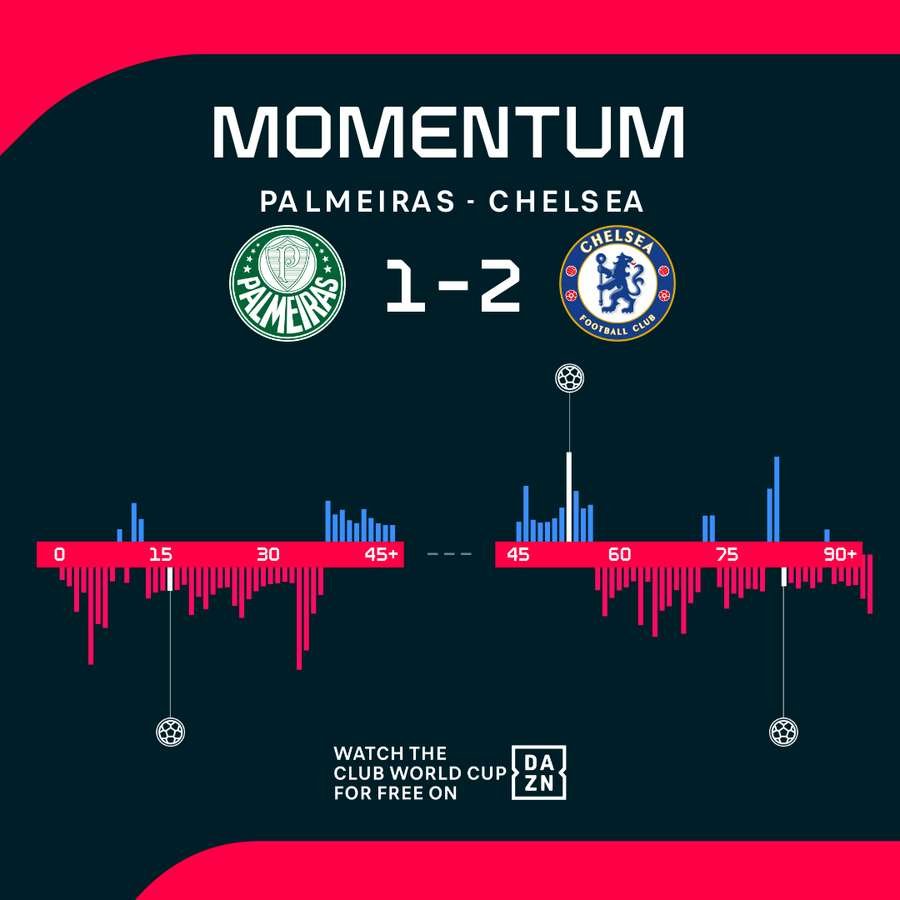Before kick-off at Lincoln Financial Field, Palmeiras and Chelsea were aware that they would face Fluminense in the Club World Cup semi-finals, after the Brazilian side’s earlier victory over Saudi Pro League heavyweights, Al Hilal.
The match began briskly, with Palmeiras registering the first shot only two minutes in, as Bruno Fuchs’s attempt was blocked. However, it was Chelsea who burst out of the blocks, led by Cole Palmer.
Chelsea Dominates Early Stages
The England international soon had his first shot on goal, quickly followed by another as Enzo Fernandez also threatened, with Chelsea controlling possession at an impressive 77.6% during the initial 15 minutes.
It seemed inevitable that the Blues would seize the lead, and in the 16th minute, that’s precisely what transpired.
Trevoh Chalobah made a confident run into Palmeiras’ half, delivering a low pass that Palmer superbly controlled before turning and calmly slotting it past the defence.
This goal would surely set off alarm bells for Palmeiras, especially considering Chelsea’s Club World Cup record of three wins and one loss when scoring first.
Chelsea continued to press, with Marc Cucurella, Chalobah, and Fernandez all contributing to an impressive eight shots attempted in the first half hour.
_______________________________________________
Sponsored:
FIFA Club World Cup – Every Match Free, exclusively on DAZN.
Sign up here to start streaming.
_______________________________________________
Passing Stats Reveal Quality Disparity
The difference in quality became evident, especially in the teams’ passing statistics. Chelsea’s players boasted pass completions of 80% and above, with Cucurella leading with an outstanding 95.5%. In contrast, most Palmeiras players fell within the 60-70% range, with Micael’s 94.6% being a notable exception.

It wasn’t until the 42nd minute that Palmeiras managed their first shot on target courtesy of Vanderlan, whose efforts reflected the Brazilian side’s struggles, significantly aided by Malo Gusto’s outstanding defence, which included five tackles in the first half—one of which earned him a yellow card.
Palmeiras fans would hardly be shocked by their team’s failure to find the net; they hadn’t scored in the first half of any of their five previous matches, compared to Chelsea, who had kept clean sheets in all five before halftime.

Supporters of Chelsea likely had few complaints about their team’s performance, even if new recruit Liam Delap struggled to make an impact, managing only eight touches before the half-time interval.
Just seven minutes into the second half, Estevao—who is set to join Chelsea post-tournament—equalised with a powerful shot from a tight angle, marking Palmeiras’ second shot on target. His enthusiastic celebration might not have resonated well with the Chelsea fans, however.
This goal represented a notable trend, being Palmeiras’ third goal scored within the opening 15 minutes of a second half in the tournament.
The equaliser provoked a swift reaction from Enzo Maresca, who made two quick substitutions, including Delap—who will be suspended for the semi-final due to accumulating two yellow cards—and urged his players to push forward.
Late Goal Sends Chelsea into Semis
This tactical shift appeared to reinvigorate Chelsea, who rattled off four shots on goal as they sought to regain control of the match.
Joao Pedro, replacing Delap, showcased his talent during his 37 minutes on the pitch, recording eight touches inside the opposition box, compared to just one for the previous player. His advances into Palmeiras’ area became a crucial aspect of Chelsea’s attack.

As the match entered its final phases, Chelsea shifted gears, limiting Palmeiras to sporadic opportunities.
With 62.7% possession and a total of 19 shots compared to Palmeiras’ seven, Chelsea’s dominance was evident.
With eight minutes remaining, a deflected shot from Malo Gusto slipped past goalkeeper Weverton, nearly securing Chelsea’s passage through to the next round. Estevao’s contributions turned out to be futile, particularly with his 17 instances of losing possession—the highest for any player on the pitch.
Despite their best efforts, Palmeiras could only muster seven attempts on goal throughout the match, marking their lowest ever total at the CWC. With only 41.0% of the action occurring in their attacking third during the closing quarter of an hour, the Brazilians were unable to keep pace with the more dynamic and solid Premier League outfit.
For a comprehensive match summary, click here.

Compiled by SportArena.com.au.
Fanpage: SportArena.com.au.
LiveScore – Live Sports Results & Odds.




